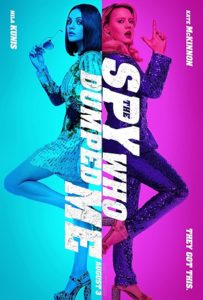Review| The Spy Who Dumped Me
 The first time I ever watched a spy movie was in the 90’s with the release of the first Austin Powers movie. I remember being delighted by childish jokes and humorous spoofs of classic movie tropes. In my mind, spy movies will always be tied with comedy. That is why I was so excited when The Spy Who Dumped Me released its first trailer. A new spy comedy about a girl who gets sucked into the world of international espionage because of an ex-boyfriend who dumped her over a text message sounded like the perfect cross between Austin Powers and the riotously funny Bill Murray film The Man Who Knew Too Little.
The first time I ever watched a spy movie was in the 90’s with the release of the first Austin Powers movie. I remember being delighted by childish jokes and humorous spoofs of classic movie tropes. In my mind, spy movies will always be tied with comedy. That is why I was so excited when The Spy Who Dumped Me released its first trailer. A new spy comedy about a girl who gets sucked into the world of international espionage because of an ex-boyfriend who dumped her over a text message sounded like the perfect cross between Austin Powers and the riotously funny Bill Murray film The Man Who Knew Too Little.
The reality of They Spy Who Dumped Me was—in comparison—lack luster. Riddled with plot-holes and unnecessary banter, the story seemed to undercut itself time after time. I’m not saying the movie was a complete failure. Mila Kunis did a fantastic job bringing her character to genuine life, and the choreography of the fight scenes were beautifully done. Though the flavor of the humor might not be for all audiences—it was targeted a little more specifically toward a female audience—it was still funny. One of the biggest problems came about as a result of absolutely no sense of real danger in the plot. Any time one of the protagonists were injured, in the next couple of scenes there would be no sign of any harm done at all.
The main character’s best friend poses another issue for me, though this may be an issue of preference. Throughout the movie it seemed as if they might be leading up the friend, Morgan, turning out to be a Russian spy. There were little hints here and there, and I would have loved to see them play it out in the story, but—alas—it was forsaken for a run-of-the-mill “you’re my best friend and I’ll always stand by you” relationship, which didn’t feel necessary at all. Even if they made Morgan a Russian spy who genuinely felt kinship with the main character and so decided to stick around and protect her because of that friendship, I would have been a lot happier with the play out of her otherwise needless character.
 Overall, it felt like a poorly written romance novel with underdeveloped male characters and the general idea of how a spy movie is supposed to look without taking into consideration the logic of why things happen in spy movies. You can argue all day that it’s just a comedy so it doesn’t need to have real logic behind the motives of the characters, but good writing of any genre dictates that if something happens there needs to be an explanation, even if that explanation is completely ridiculous.
Overall, it felt like a poorly written romance novel with underdeveloped male characters and the general idea of how a spy movie is supposed to look without taking into consideration the logic of why things happen in spy movies. You can argue all day that it’s just a comedy so it doesn’t need to have real logic behind the motives of the characters, but good writing of any genre dictates that if something happens there needs to be an explanation, even if that explanation is completely ridiculous.
But even a movie as almost-good as The Spy Who Dumped Me can have true gems hiding within the story. My favorite themes that the movie tackled could be considered common elements in spy movies, but approached from a unique perspective. Trust, feminism, and murder were all issues that cropped up for the characters throughout the story, and these themes were dealt with not only from the perspective of a lay-person, but from the lens of women. It might seem like a simple distinction, but having a female perspective on these themes changed the feel of it in a significant way.
Trust Issues
Every person has been through a situation where they have trusted the wrong person. In They Spy Who Dumped Me, main character Audrey (Kunis) is told by her ex-boyfriend Drew (Justin Theroux) not to trust anyone as he gives her a trophy to take to Europe and hand off to his associate. From that moment, Audrey is thrown into his world, with assassins tracking their every move, rival intelligence agencies breathing down their necks, and no idea which people are the good guys and which are the bad guys. It doesn’t help that the supposed good guys on separate occasions throw her in the back of a van, threaten her with guns, and try to blow her up. She even finds out that the people she thought were her ex’s parents were part of a terrorist organization. Talk about an evil mother-in-law. With all of Drew’s secrets and his erratic behavior, eventually Audrey can’t even trust what he’s told her.
 This is different from normal trust issues in movies because of how Audrey deals with mistrust. In most spy movies when a character learns they can’t trust people, they tend to get crafty and meticulous. The main character usually learns that the only person they can rely on is themselves. This is not the case for Audrey. She goes through a lot of trouble to decide whether or not she wants to trust people. She doesn’t become isolated and more perfect as an action hero as a result—she actually makes herself better at judging a person’s character. In the beginning of the story she had absolutely no skill at this, falling for smarmy Drew with his handsome face and easy charm when he’s the kind of person who would insult her best friend with no more reason than the fact that she’s protective of Audrey and wants what’s best for her. By the end of the movie Audrey is accurately determining friend and foe, and managing to save her own life with that newfound skill.
This is different from normal trust issues in movies because of how Audrey deals with mistrust. In most spy movies when a character learns they can’t trust people, they tend to get crafty and meticulous. The main character usually learns that the only person they can rely on is themselves. This is not the case for Audrey. She goes through a lot of trouble to decide whether or not she wants to trust people. She doesn’t become isolated and more perfect as an action hero as a result—she actually makes herself better at judging a person’s character. In the beginning of the story she had absolutely no skill at this, falling for smarmy Drew with his handsome face and easy charm when he’s the kind of person who would insult her best friend with no more reason than the fact that she’s protective of Audrey and wants what’s best for her. By the end of the movie Audrey is accurately determining friend and foe, and managing to save her own life with that newfound skill.
By changing how she trusts people rather than cutting off her ability to trust completely, Audrey actually overthrows the standard procedure in spy movie behavior. It’s a good pattern to follow in real life, too. Trusting in your own discretion, allowing others to get close to you but also paying attention to their words and actions so they can’t surprise you is a lesson in relationships that we could all learn.
Trusting people does not mean blindly following them into danger. The Bible says we’re supposed to be innocent as lambs and cunning as vipers. We can allow ourselves to rely on others without necessarily opening ourselves up to be deceived. Christians are supposed to think. Christians are supposed to weigh the things others tell us against the ultimate truth—God’s truth.
Women Can Do Anything
Feminism was another hot topic in the movie that came up time and again. Specifically with Morgan (Kate McKinnon), feminism was a topic that was always fresh on her mind. From being objectified at a bar to praising a high powered woman for not sacrificing her femininity as she gained power, Morgan was female, strong, and proud throughout the entire movie. Except.
I hate to say except in a situation like this. The Spy Who Dumped Me was directed and written by women and a lot of the words they used on the topic of feminism were dead on. The use of women in this spy movie was one of the best I’ve ever seen in this genre. So when I say except, know that this is me at my very nit-pickiest and I hate myself for bringing it up, except I feel that it needs to be said. Feminism in this movie was a big deal, but it bothered me that Morgan’s idea of femininity with the high powered woman was entirely about the way she looked. In fact, any time feminism was brought up by Morgan, for the most part it was just words of judgment about how men were treating her, putting words into other people’s mouths so that they were saying the right thing, or deciding what femininity is based on looks alone. The only truly feminist thing it felt like Morgan did throughout the movie was force Audrey to acknowledge that the things she did up to that point were good and worthwhile and that her successes should not be glossed over.
 The reason I bring this up is because one of the very basic issues with the objectification of women has to do with our appearance. To judge a person’s femininity based entirely on appearance is off-putting. The line about her being the Beyonce of the government was funny enough, but it leans too close to an issue that is at the heart of what is wrong with how people deal with one another. We judge too much by appearance without taking into consideration content of character. I would have preferred to see Morgan’s feminist ideals in action rather than through witty banter.
The reason I bring this up is because one of the very basic issues with the objectification of women has to do with our appearance. To judge a person’s femininity based entirely on appearance is off-putting. The line about her being the Beyonce of the government was funny enough, but it leans too close to an issue that is at the heart of what is wrong with how people deal with one another. We judge too much by appearance without taking into consideration content of character. I would have preferred to see Morgan’s feminist ideals in action rather than through witty banter.
Feminism is a difficult topic for many in relation to what God wants versus what we want as humans. Jesus points out many times throughout the New Testament that it is not outward appearance that interests God. In the same way, outward appearance doesn’t show how devoted a person is to her femininity. The other aspects of feminism all come back to what Jesus says about love; “Love covers over a multitude of sin”. If we are loving women then we aren’t judging them by how many kids they have, how they dress, or paying them less money than men because “reasons”. If we love women then we treat them with respect and dignity just like we treat all people because no one should have to earn your respect; you give it graciously because you are also a sinner who doesn’t deserve grace but was given it anyway. Feminism is loving people and treating them fairly, something that Morgan did very well when her friend tried to brush off all the incredible things she did.
Murder She Wrote
Another interestingly approached theme in The Spy Who Dumped Me was the issue of murder and whether or not it was acceptable. In most spy movies, the characters will kill with impunity and very little thought is put into it. However, when Audrey and Morgan kill people in this movie they give it a lot of thought. There are real moral implications to their actions, although those moral implications are brushed off later in the story. Morgan doesn’t want to go to the police for help because she killed someone. Audrey has a panic attack later on because she kills a person. These actions lead to the characters doing something that not many spy movies take the time to do; they place the characters in a position where they need to soothe their conscience through justification of their actions. “It doesn’t count, it was self defense,” Morgan tells her mother over the phone. Rather than deal with the moral implication of murder, the characters choose to think of it in a different way that eases their burden. Not many spy movies go through this process of justification as the main characters become more comfortable with their roles as killers.
 Murder in the Bible is a sin. To take another person’s life whether in self-defense or not is a sinful action. Even David, who was God’s beloved and chosen king to sit on the throne of Israel, was not able to build a temple for God because he was a man of war and had taken many lives. Reasons that humans find acceptable for killing are not acceptable to God. Even so, God is able to forgive sin through the atonement of Jesus. We still must face the worldly consequences, but as long as we accept Jesus as our Lord and Savior then any guilt we have for shedding blood for any reason can be wiped away.
Murder in the Bible is a sin. To take another person’s life whether in self-defense or not is a sinful action. Even David, who was God’s beloved and chosen king to sit on the throne of Israel, was not able to build a temple for God because he was a man of war and had taken many lives. Reasons that humans find acceptable for killing are not acceptable to God. Even so, God is able to forgive sin through the atonement of Jesus. We still must face the worldly consequences, but as long as we accept Jesus as our Lord and Savior then any guilt we have for shedding blood for any reason can be wiped away.
And the Oscar Goes to…pretty much anyone else
The Spy Who Dumped Me was an OK movie, though not profound or particularly polished. The cast was unbalanced with Mila Kunis acting circles around her costars. The male characters were sub-par, though it was nice to see good female characters with poorly written men rather than the other way around, which is much more common. The themes were pretty ordinary and straightforward for this type of film, although it was saved somewhat by an interesting take on the themes which was a welcome change. The things that the movie did well—such as the fight scene choreography and the action sequences—were done very well. It wasn’t a classic of spy comedies, but it is at the very least worth checking out from the library or renting for a dollar one night for some cheap fun.







